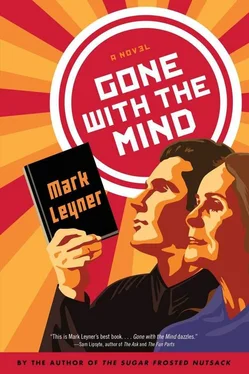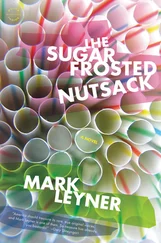Of course the battle between the materialist rationalists and the anti-materialist irrationalists is long over, and the anti-materialist irrationalists lost, and we await our UFOs and our flying balconies to come and bear us away.
The chorus in Seneca’s Thyestes asks: “Will the last days come in our time?” And I would say, Yes, absolutely. I mean, the last days might very well come during this reading tonight. I think my mom mentioned before that the floodwaters are rising, right? And assassins, onryōs (vengeful spirits), first-person shooters…mall shooters, whatever you want to call them…are all wandering around, floating around. And I don’t think any of this should especially disturb anyone. I don’t think it’s anything to get all bummed out about. I think it should actually make everyone feel really good. Oprah said to Lindsay Lohan: “Vultures are waiting to pick your bones…that should liberate you.” Someone in the video game Total War: Shogun 2 says something to the effect of: “a samurai should not scandalize his name by holding his one and only life too dear.” In other words, the true samurai enters the battle with no thought of return. And I really think that’s how you have to look at it when you do a nonfiction reading, when you really commit to only presenting empirically verifiable material, when you’re really deadly serious about that. And I bring up the Japanese writer Yukio Mishima now, not because he was a sickly, pale, pampered introvert of a child who grew up to become obsessed with bodybuilding and who, as an adult, when his mother complained that “Mommy’s foot hurts,” proceeded to lick the sore area in front of friends and family, but because he gave, on November 25, 1970, one of the best nonfiction readings ever given when he stepped out onto a balcony (not the flying balcony of the Palazzo Venezia, but a balcony nonetheless) and declaimed a prepared manifesto to several hundred soldiers gathered below who mocked and jeered him (and who, by the way, weren’t officially “there for the reading” either), returned inside, disemboweled himself, and was then beheaded by a member of his private militia. I’m qualifying this by calling it one of the best nonfiction readings ever given. It could have been one of the great nonfiction readings ever given if Mishima’s mother, Shizue Hiraoka, had been there, but she wasn’t (although she did attend his funeral). I mean, you’d have to say — and I think this is so obvious given the fact that being mocked, jeered at, and martyred in the presence of one’s mom is the key, the key ingredient here — that Christ on the Cross (in the presence, of course, of his mother, the Virgin Mary) gave one of the greatest nonfiction readings ever given.
Now, I just want to fast-forward six hours or so in the Gospel narrative to make a small point. The Virgin Mary was not a Ferbering mother. And though the lifeless body of Christ did not literally cry out for her, the exigencies of Christian doctrine surely did. And unlike my mom on those unfortunate nights alluded to earlier, Mary did respond, and unlike my mom, Mary cradled her son in her arms…and hence the enormously popular, endlessly reproduced, and invariably eroticized image of the Pietà. Now, in all fairness, we can’t underestimate the influence on young mothers — and my mom was only, what, barely twenty at that time? — we can’t underestimate the…the enormous influence of pro-Ferbering authorities like Dr. Spock who, when it came to children’s sleep problems — and this may surprise you guys — was more draconian than even Ferber himself. (The PANDA EXPRESS WORKER and the SBARRO WORKER are paying absolutely no attention to anything MARK is saying.)
But the simple truth of it is that if you take a certain type of boy with an extremely delicate temperament and you turn his bedroom into a dark, terrifying sort of prison cell (even if it’s only for a couple of nights), a significant amount of self-radicalization is going to occur with that type of child in that type of environment. I still suffer, to this day, from an intractable compulsion to fold things into thirds instead of halves, which I believe is directly attributable to the Ferbering.
Okay, you guys might be thinking to yourselves, how does Christ on the Cross constitute a nonfiction reading? The Seven Statements from the Cross (“Father, forgive them, for they do not know what they do,” “Truly, I say to you, today you will be with Me in paradise,” “Woman, behold your son. Son, behold your mother,” etc.) were extemporaneous utterances, they were not recited from any kind of pre-prepared text, so how is that a reading? To which I would say, very simply, that for a divine being like Jesus Christ, all of history — from the beginning (“word one”) through eternity — has already been inscribed. All of it has already been written. To a divine being, it’s all already a book, or a script, whatever. So, anything a divinity says, any seemingly spontaneous utterance He or She might make, constitutes a reading.
As I look out tonight, there are no Roman soldiers…but there are empty chairs to mock me. And some sort of…some sort of, at least virtual martyrdom impends; I can feel that in my bones. And my mom is right here, and I appreciate that tremendously. And so, I’m very proud tonight to be here at the Nonfiction at the Food Court Reading Series. And as I look out at my mother right now, eating pork fried rice out of a Styrofoam shell from Panda Express, I can’t help but be reminded of when that teacher at James F. Murray No. 38 Elementary School in Jersey City used to hold me up to the window to show me that my mom was waiting for me outside in the schoolyard, to reassure me, to demonstrate to me that she hadn’t “abandoned” me again, as I apparently felt she had during her second pregnancy. I guess like a lot of kids that age, I’d occasionally fabricate the vocations of my parents, and I remember once telling that particular teacher that my father, an attorney in Jersey City, was — and I’m paraphrasing here, I don’t remember my exact words — that he was actually a tropical agronomist who specialized in diseases of the banana, perhaps a sly Oedipal dig at his virility. I remember the teacher smiling at that. She was a very smiley, very accommodating woman. But I always suspected that her smile was a mask. To me, even at that tender age — I think I was six — it suggested a latent misery, hidden by a great labor of repression and dissimulation. But as I look out at my mom tonight…Y’know, Heraclitus said, “No man ever steps in the same river twice, for it’s not the same river and he’s not the same man.” But I also think that no son sees the same mother twice, for it’s not the same mother and he’s not the same son. So as I look out at my mom tonight, I see not only a woman with a unique sociocultural history as a daughter, as a mother, as a grandmother, a woman with an autobiography of her own, but I also see a techno-organic aggregate body that is bacterial, fungal, mineral, metal, electrochemical, digitally informational, etc., and then, if I put on these reading glasses, which help me a lot with close-range vision, but pretty seriously degrade my ability to focus on anything in the distance, I see a sort of flat, two-dimensional, distorted female figure composed of splintered planes, and then the more I squint through the reading glasses, the more she now seems reduced to a purely geometric abstraction, a vertical element perpendicular to a horizontal element, and she’s achieved an object’s phenomenological status as a thing prior to any meaning…and if I look through them like this — backwards — she seems to disaggregate completely. She becomes an exploded diagram of herself. Like the instructions you get with furniture from Ikea. And here the intelligible dimensions of the mother are extended into infinite space — the macroscopic realm of celestial bodies and the vast distances between them, and the intimate realm of microscopic organisms and cells. And the image of the mother as exploded diagram is, of course, the image of the mother as suicide bomber.
Читать дальше












